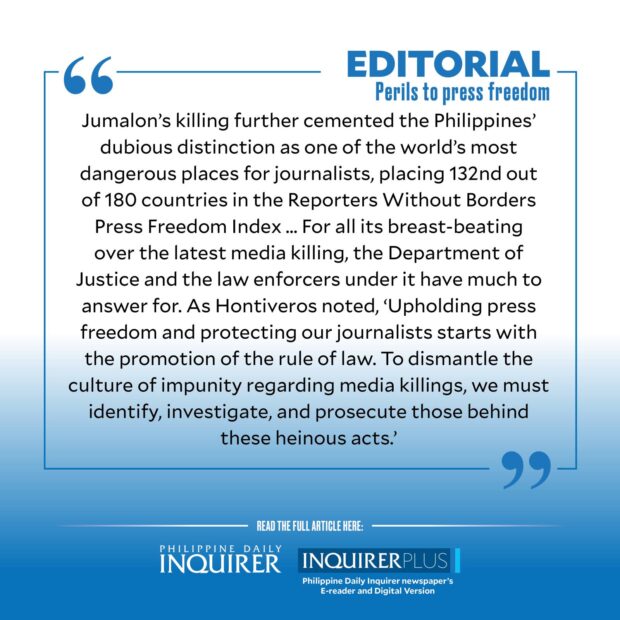Perils to press freedom

The killing of broadcaster Juan Jumalon in Calamba, Misamis Occidental, on Sunday is the fourth media slaying under the present dispensation, a grim reminder that despite President Marcos’ less adversarial stance toward the press as compared to his predecessor, the threat to press freedom and journalists remains.
Jumalon, 57, popularly known as DJ Johnny Walker, was livestreaming his program in his home studio when a lone gunman barged in and shot him. Police have identified three suspects so far, and are investigating whether the killing was work-related.
The killing has drawn condemnation from rights groups, media organizations, civil society, and foreign embassies, with Mr. Marcos vowing “full consequences” for the perpetrators. While commendable, the words ring hollow amid the still-unresolved cases of at least two media killings in recent times, the unexpected complications a disturbing indication of the country’s broken justice system. More disheartening is how these crusading journalists were eliminated for just doing their job.
Article continues after this advertisementThere’s radio reporter Rey Blanco of Mabinay town in Negros Oriental who was stabbed dead by suspect Charles Amada on Sept. 18 last year. Amada said he was angered by Blanco’s on-air commentaries against him and his political family. Blanco frequently reported on local politics, corruption, and social issues, including illegal quarrying, overpricing of medical supplies during the pandemic, and alleged electoral fraud in the 2022 elections.
Barely two weeks later, on Oct. 3, 2022, hard-hitting radio commentator Percival Mabasa was shot dead in Las Piñas City, with the alleged gunman surrendering and implicating several others, including former Bureau of Corrections (BuCor) chief Gerald Bantag. Despite being linked to the killing and its alleged mastermind and having a pending charge and warrant against him, the BuCor official has yet to be arrested.
In May this year, Cresenciano Bunduquin was shot by two gunmen on a motorcycle in Calapan City, Oriental Mindoro. The radio broadcaster had been reporting on environment issues, his listeners said.
Article continues after this advertisementAt a recent forum to mark the first anniversary of Mabasa’s death, Sen. Risa Hontiveros slammed the country’s “sorry track record [in] achieving justice for media killings.” Citing a report by the Center for Media Freedom and Responsibility, the senator noted that of the 176 media workers killed in the Philippines since 1986, only 19 suspects have been convicted so far.
Jumalon’s killing further cemented the Philippines’ dubious distinction as one of the world’s most dangerous places for journalists, placing 132nd out of 180 countries in the Reporters Without Borders Press Freedom Index. The Committee to Protect Journalists ranked the country as 8th in its 2023 Global Impunity Index, which spotlights countries worldwide where journalists are slain and their killers go free.
For all its breast-beating over the latest media killing, the Department of Justice and the law enforcers under it have much to answer for. As Hontiveros noted, “Upholding press freedom and protecting our journalists starts with the promotion of the rule of law. To dismantle the culture of impunity regarding media killings, we must identify, investigate, and prosecute those behind these heinous acts.” Transparency in police investigations, better protection for witnesses to encourage them to come forward, and reviving the human rights desk in police stations would go a long way to restore trust in law enforcers and promote cooperation with the community in solving crimes.
Media owners can invest in cybersecurity infrastructure as well to track online threats against their reporters, and help bring these to the attention of the proper government body. The Freedom for Media Freedom for All, a coalition of press freedom advocates, meanwhile called for a diligent monitoring of court hearings in cases against journalists, “making sure that the accused are represented by their lawyers so that court proceedings are not delayed by their absences.”
The Red-tagging of journalists for their critical commentaries and adverse stance against government must also be publicly discouraged, as this has often led to individuals being detained by overzealous state agents, or targeted by criminal elements. Tarring the reputation and putting the lives of journalists at risk with mere accusations must be heavily sanctioned, and the offenders haled to court. This would create a positive environment where journalists can practice their profession without fear for their lives and safety.
Sanctioning fake news peddlers while allowing the free flow of information would make critical commentaries the norm in a democracy, instead of an aberration that must be reined in by all means necessary.
While undoubtedly sincere in his outrage at the Jumalon killing, the President must translate his words into action if he were to convince foreign investors about the business prospects of a flourishing democracy, where media is respected and journalists amply protected.
















